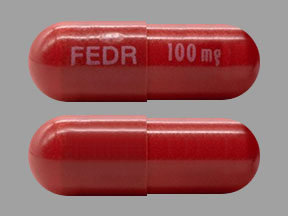Inrebic Dosage
Generic name: FEDRATINIB HYDROCHLORIDE 100mg
Dosage form: capsule
Drug class: Multikinase inhibitors
Medically reviewed by Drugs.com. Last updated on May 12, 2025.
Required Concomitant Medications
During treatment with INREBIC, all patients should receive prophylaxis with thiamine 100 mg orally daily.
Recommended Dosage
Conduct baseline testing of thiamine (Vitamin B1) levels prior to initiation of INREBIC.
The recommended dosage of INREBIC is 400 mg taken orally once daily for patients with a baseline platelet count of greater than or equal to 50 × 109/L.
Modify the dose for patients using concomitant strong CYP3A4 inhibitors, and in patients with severe renal impairment (creatinine clearance (CLcr) 15 mL/min to 29 mL/min).
Patients that are on treatment with ruxolitinib before the initiation of INREBIC must taper and discontinue according to the ruxolitinib prescribing information.
Administration Information:
- •
- INREBIC may be taken with or without food. Administration with a high fat meal may reduce the incidence of nausea and vomiting.
- •
- If a dose of INREBIC is missed, the next scheduled dose should be taken the following day.
- •
- For patients who have difficulty swallowing capsule(s) whole or those with a nasogastric tube:
- o
- Open the capsule(s).
- o
- In a glass container, mix the content of the capsule(s) with approximately 180 mL of Ensure® Plus liquid nutritional supplement at room temperature [between 20°C to 25°C (68°F to 77°F)].
- o
- Promptly administer the mixture orally or through a nasogastric tube (French size 14 or 16) within 2 hours of preparation.
- o
- If using a nasogastric tube, flush it with 60 mL of water after administering the mixture.
- o
- Discard the prepared dose if not given within 2 hours.
Monitoring for Safety
Obtain the following blood tests prior to starting treatment with INREBIC, periodically during treatment, and as clinically indicated:
- •
- Thiamine (Vitamin B1) level
- •
- Complete blood count with platelets
- •
- Creatinine and BUN
- •
- Hepatic panel
- •
- Amylase and lipase
Dose Modifications with Concomitant Use of Strong CYP3A4 Inhibitors
Reduce INREBIC dose when administering with strong CYP3A4 inhibitors to 200 mg once daily.
In cases where coadministration with a strong CYP3A4 inhibitor is discontinued, INREBIC dosage should be increased to 300 mg once daily during the first two weeks after discontinuation of the CYP3A4 inhibitor, and then to 400 mg once daily thereafter as tolerated.
Dose Modifications for Severe Renal Impairment
Reduce INREBIC dose to 200 mg once daily in patients with severe renal impairment (creatinine clearance (CLcr) 15 mL/min to 29 mL/min as estimated by Cockcroft-Gault (C-G) equation).
Dose Modifications for Adverse Reactions
Modify dose for hematologic and nonhematologic adverse reactions per Table 1 and Table 2. Discontinue INREBIC in patients unable to tolerate a dose of 200 mg daily. See Warnings and Precautions for other mitigating strategies.
|
Hematologic Adverse Reactions |
Dose Reduction |
|
Grade 4 Thrombocytopenia or |
Interrupt dose until resolved to Grade 2 or lower or baseline. Restart dose at 100 mg daily below the last given dose. |
|
Grade 4 Neutropenia |
Interrupt dose until resolved to Grade 2 or lower or baseline. Restart dose at 100 mg daily below the last given dose. |
Consider dose reductions for patients who become transfusion-dependent during treatment with INREBIC.
|
Nonhematologic Adverse Reactions |
Dose Reduction |
|
Grade 3 or higher Nausea, Vomiting, or Diarrhea not responding to supportive measures within 48 hours |
Interrupt dose until resolved to Grade 1 or lower or baseline. Restart dose at 100 mg daily below the last given dose. |
|
Grade 3 or higher ALT, AST, or Bilirubin |
Interrupt dose until resolved to Grade 1 or lower or baseline. Restart dose at 100 mg daily below the last given dose. |
|
Grade 3 or higher Other Nonhematologic Toxicities |
Interrupt dose until resolved to Grade 1 or lower or baseline. Restart dose at 100 mg daily below the last given dose. |
Management of Thiamine Levels and Wernicke's Encephalopathy (WE)
Assess thiamine levels and nutritional status prior to starting INREBIC. Do not start INREBIC in patients with thiamine deficiency. However, if thiamine levels are low, replete thiamine prior to starting treatment. While on INREBIC treatment all patients should receive prophylaxis with daily 100 mg oral thiamine and should have thiamine levels assessed as clinically indicated. If Wernicke's encephalopathy is suspected, immediately discontinue treatment with INREBIC and initiate parenteral thiamine treatment. Monitor until symptoms resolve or improve and thiamine levels normalize.
Frequently asked questions
More about Inrebic (fedratinib)
- Check interactions
- Compare alternatives
- Pricing & coupons
- Drug images
- Side effects
- During pregnancy
- FDA approval history
- Drug class: multikinase inhibitors
- Breastfeeding
- En español
Patient resources
Professional resources
Related treatment guides
See also:
Further information
Always consult your healthcare provider to ensure the information displayed on this page applies to your personal circumstances.


